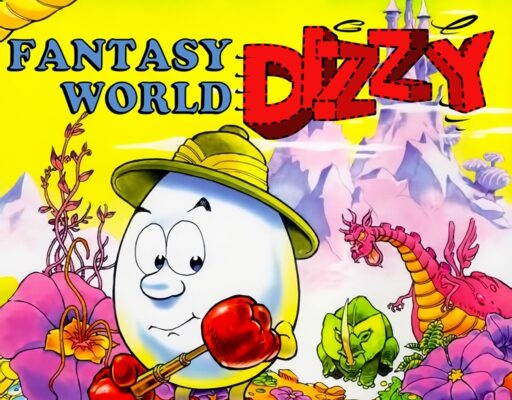
Fantasy World Dizzy
Like most people who played Fantasy World Dizzy in the 21st century, I mostly did so to give context to the Zero Punctuation/Fully Ramblomatic running gag of naming it the best game ever. But that wasn’t the only reason. I’m increasingly fascinated by the early gaming divide between Europe and North America, and how it shaped future perceptions of game quality. Europe favoured home computers over consoles, which gave them a head start in the departments of storytelling and general intellectualism. Nevertheless, seemingly every title I’ve tried from that era has bounced off of me – even supposed classics like Broken Sword and Beneath a Steel Sky. I can’t help but wonder if one or both sides were situations where “you just had to be there,” and my internalization of what made a game good in North America precludes me from appreciating the European alternatives.
Fantasy World Dizzy is lending credence to that hypothesis. It’s part of an incredibly prolific and relatively successful series from that time, but from my perspective, its design is truly abysmal. Some of it is simply due to age – puzzle-based adventure games with fail states were considered acceptable and arguably desirable at the dawn of the 90s – but other parts can’t be excused. In particular, the mix of action and puzzle-solving is akin to a mixture of bleach and ammonia. Unintuitive adventure game logic is a problem on its own, but it’s much worse when you can’t even tell if there’s a puzzle that needs completing before tackling a movement challenge. Platforming sections also aren’t “solved” once bypassed, which means you need to deal with them repeatedly as you wander back and forth amassing puzzle pieces.
It would help if the platforming was more forgiving. It uses a rigid jump trajectory, its hit detection is spotty, and its inconsistent landing physics are one of the franchise’s trademark mechanics. Specifically, the protagonist’s somersaulting motion only ends when his feet hit the floor – a feature that seemingly exists solely to cause unpredictable deaths. All of these frustrations are compounded by the use of limited lives. There’s no enjoyment to be found in redoing a puzzle over and over after you’ve already discovered the solution, especially when the reason you’re redoing it is an unrelated and unfair obstacle. None of this can be justified by saying the developers didn’t know any better at the time. This is the third game in the series, and I’m given to understand that it’s actually the most humane of the three.
Surprisingly for a game that’s older than me, the presentation of Fantasy World Dizzy holds up better than anything else. It’s stuck with the technical limitations of the ZX Spectrum, of course, but I can tell what everything is, and none of it is visually boring, which is the best I can hope for. The audio also somehow never gets old despite consisting of only one song and some straightforward sound effects. For all their frustrations, the puzzles showcase some decent creativity, and there’s a lot of genuinely funny dialogue. The latter is astonishing when compared to the stunted scripts that were possible on something like the NES. It’s almost enough to make you forget that your goal is still just to rescue a love interest in a plot whose villains never actually appear in-game.